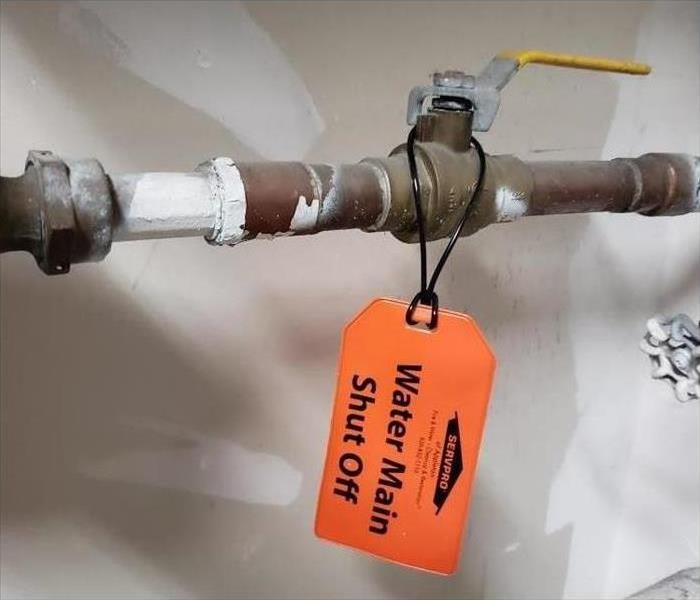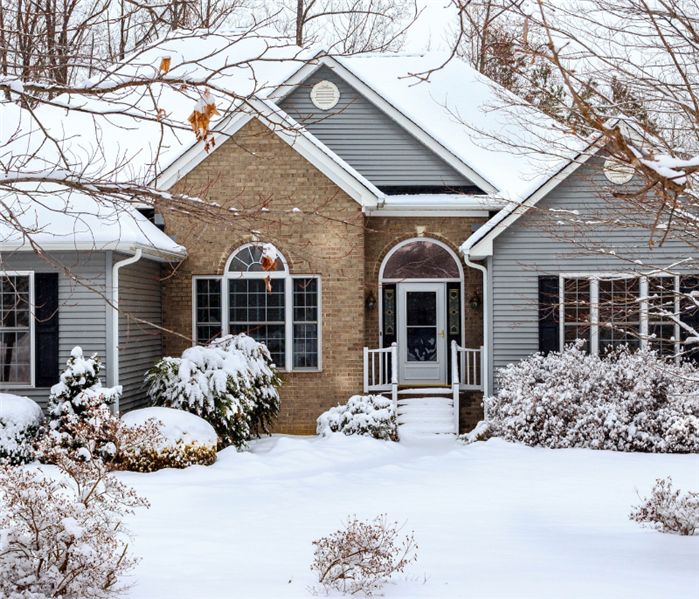Archived Water Damage Blog Posts
Why SERVPRO® Is the Best Choice for Commercial Water Damage Restoration
9/6/2024 (Permalink)
When water damage strikes a commercial property, quick and professional response is crucial to minimize downtime and prevent further damage. SERVPRO® is the trusted choice for businesses because of their expertise, speed, and comprehensive service.
With 24/7 emergency response, SERVPRO® teams are on-site fast to assess the damage and begin the restoration process immediately. They use advanced equipment to remove water, dry the space, and prevent mold growth, ensuring minimal disruption to your operations.
SERVPRO’s® highly trained technicians understand the unique challenges of commercial properties and are prepared to handle jobs of any size, from small offices to large warehouses. They also work directly with insurance companies to streamline the claims process.
When your business faces sudden water damage, trust SERVPRO® to respond quickly and get your property back to normal efficiently.
Signs Your Home is at Risk for Frozen Pipes and How to Prevent Water Damage
9/6/2024 (Permalink)
Frozen pipes can lead to significant water damage if not addressed promptly. Here are key signs that your home might be at risk and steps you can take to prevent problems:
Signs of Risk
- Unusually Low Temperatures: If temperatures drop significantly, especially below 32°F, your pipes are at higher risk of freezing.
- Drafty Areas: Cold drafts near pipes or in unheated spaces like basements and attics increase the chance of freezing.
- No Water Flow: If you notice reduced water flow or no water coming from certain fixtures, it might indicate a frozen pipe.
Prevention Tips
- Insulate Pipes: Wrap pipes in insulation, particularly those in unheated areas.
- Seal Drafts: Use caulk or weather stripping to seal gaps around windows, doors, and pipe openings.
- Keep the Heat On: Maintain a consistent temperature in your home, even when you’re away.
- Allow Faucets to Drip: Letting faucets drip slightly can keep water moving and reduce freezing risk.
If you suspect frozen pipes or experience any water damage, call SERVPRO immediately. Our team is available 24/7 to handle emergency water damage and help restore your home quickly and efficiently.
Sump Pump
2/15/2023 (Permalink)
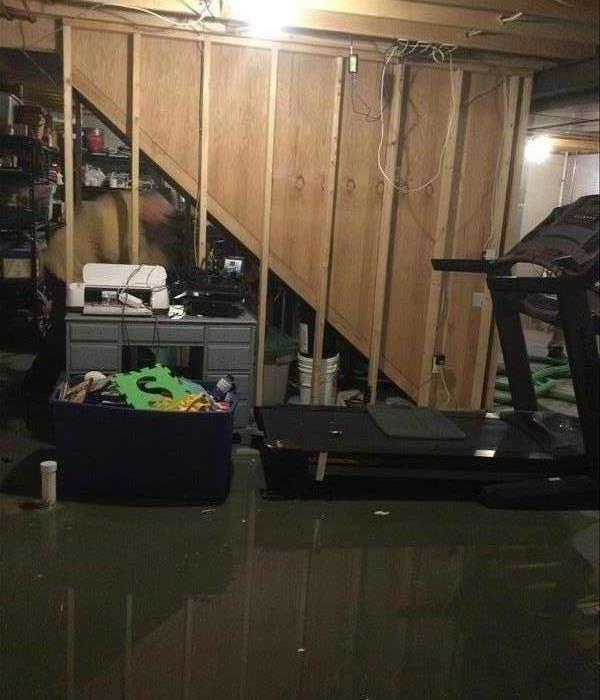 No checking sump pump can cause a flooded basement
No checking sump pump can cause a flooded basement
Sewage backups in your home can be a serious issue and pose health risks to you and your family. It's important to address the problem quickly and properly to ensure the safety and cleanliness of your home. Here are some reasons why you might consider using SERVPRO of Brown County for sewage cleanup:
Fast Response: SERVPRO of Brown County is available 24/7 and can respond quickly to your sewage cleanup needs. They understand that time is of the essence in these situations, and they have the tools and experience to address the problem promptly.
Safety: Sewage backups can contain harmful bacteria and pathogens that can be dangerous to your health. SERVPRO of Brown County has the necessary personal protective equipment (PPE) and expertise to safely and effectively clean up the sewage and restore your home to a safe and healthy condition.
Professional Equipment: SERVPRO of Brown County has access to state-of-the-art equipment that is specifically designed for sewage cleanup. They have specialized tools and cleaning products that can help eliminate any odors and prevent the growth of mold or bacteria.
Insurance: Dealing with insurance claims can be a hassle, but SERVPRO of Brown County can help simplify the process. They can work directly with your insurance company to handle the paperwork and ensure that your claim is handled properly.
Overall, SERVPRO of Brown County is a reputable and experienced company that can provide prompt and professional sewage cleanup services to ensure the safety and health of your home and family.
blog post about checking your sump pump to prevent water damage and why use SERVPRO of Brown County if you need restoration services
Possible blog post:
As a homeowner, you want to make sure that your property is protected from water damage. One important tool that can help prevent water from entering your basement is a sump pump. However, if your sump pump fails or malfunctions, you could be at risk for costly water damage. In this blog post, we'll discuss how to check your sump pump and why you should consider using SERVPRO of Brown County if you need restoration services.
Checking Your Sump Pump
Test the pump: Pour water into the sump pit until the float rises and triggers the pump. This should cause the pump to turn on and pump the water out of the pit. If the pump doesn't turn on, you may need to check the power source or the float switch.
Check the discharge line: Make sure that the discharge line is properly attached and free from any obstructions. The line should be directed away from the house to prevent water from flowing back towards the foundation.
Clean the pump: Remove any debris or sediment that may have accumulated in the sump pit. This can help prevent clogs and prolong the life of the pump.
Consider a backup system: A backup sump pump can provide additional protection in case of a power outage or mechanical failure. Battery-powered and water-powered backup systems are available and can be installed by a professional.
Using SERVPRO of Brown County for Restoration Services
If your sump pump fails and your basement or property experiences water damage, it's important to act quickly to prevent further damage and minimize the cost of repairs. SERVPRO of Brown County is a professional restoration company that specializes in water damage restoration and cleanup services. Here are some reasons why you might consider using SERVPRO of Brown County:
Fast Response: SERVPRO of Brown County is available 24/7 and can respond quickly to your water damage emergency. They understand that time is of the essence in these situations, and they have the tools and experience to address the problem promptly.
Professional Equipment: SERVPRO of Brown County has access to state-of-the-art equipment that is specifically designed for water damage restoration. They have specialized tools and cleaning products that can help remove any water and prevent the growth of mold or bacteria.
Experienced Technicians: SERVPRO of Brown County technicians are highly trained and experienced in water damage restoration. They know how to properly assess the damage and develop a customized plan to restore your property to its pre-damage condition.
Insurance: Dealing with insurance claims can be a hassle, but SERVPRO of Brown County can help simplify the process. They can work directly with your insurance company to handle the paperwork and ensure that your claim is handled properly.
Overall, checking your sump pump regularly and addressing any issues can help prevent water damage in your home. However, if you do experience water damage, SERVPRO of Brown County is a reputable and experienced company that can provide prompt and professional restoration services to ensure the safety and health of your home and family.
Water Shut Off Tags
1/24/2023 (Permalink)
If water starts gushing in your home or business, would you know where or how to stop it? Each building, commercial or residential, has a main valve that controls all the running water in the property. But if you’ve never had to shut the water off, it can be hard to know what to do in case of an emergency.
SERVPRO of Brown County is happy to supply water main shut off tags that can help you identify the main shut off handle in your home. The tags are made with a bendable plastic that can hang right on the handle of the shut off valve. They have been creatively engineered in a bright orange color to be seen easily and even has a pouch on the backside where your local SERVPRO representative’s business card inserted for easy access to contact information for your local SERVPRO franchise. These simple yet necessary items are readily available to you and your property, all you have to do is get in contact with your local SERVPRO franchise or representative to be well-suited for a possible water emergency.
Flooding or Water Damage
9/22/2021 (Permalink)
When flooding or water damage happens at your home or business, time is of the essence. The faster you call team SERVPRO for help, the less damage that unexpected water will be able to do.
According to the American Insurance Association, 37% of all homes will suffer water damage each year. Of the water damage that occurs, the association says 93% of that damage is preventable. According to the association, the first 24 to 48 hours are the most crucial when dealing with water damage.
SERVPRO has a timeline that lists the damage you can expect following a flood or water loss:
Within Minutes
- Water quickly spreads throughout your property, saturating everything in its path.
- Water is absorbed into walls, floors, upholstery, and belongings.
- Furniture finishes may bleed, causing permanent staining on carpets.
- Photographs, books, and other paper goods start to swell and warp.
Hours 1 - 24:
- Drywall begins to swell and break down.
- Metal surfaces begin to tarnish.
- Furniture begins to swell and crack.
- Dyes and inks from cloth and paper goods spread and stain.
- A musty odor appears.
48 Hours to 1 Week:
- Mold and mildew may grow and spread.
- Doors, windows, and studs swell and warp.
- Metal begins to rust and corrode.
- Furniture warps and shows signs of mold.
- Paint begins to blister.
- Wood flooring swells and warps.
- Serious biohazard contamination is possible.
More Than 1 Week:
- Restoration time and cost increase dramatically; replacing contaminated materials and structural rebuilding may be extensive.
- Structural safety, mold growth, and biohazard contaminants pose serious risks to occupants.
The message here is that if water ends up where it does not belong, you should NOT WAIT to call for help. Getting someone on the scene ASAP will only save time and money in the long run.
We’ve heard before that people will sometimes not even realize they’ve experienced a water loss until days, maybe even weeks later. For example, they may have a basement they don’t go into very often that floods. So, we recommend checking those isolated areas on a regular basis and after any major weather event, like torrential rains.
There are some steps you should also take while waiting for help to arrive. SERVPRO recommends as follows:
- Stop the source of the water: if, for example, you have a broken pipe, make sure to turn off the water supply to prevent anymore leaking.
- Remove items of value: move any valuables and furniture away from the water, to prevent permanent damage to those items.
- Prevent the spread of moisture: as best you can, try to soak up any water by toweling or mopping the area. This will be a good temporary help. (Only do this if the water is clean!)
- Take notes and photos for your insurance company.
- Stay Safe! Make sure to turn off any electrical connections that could pose a danger in the flooded area. DO NOT mop or towel up any water that may be contaminated, if it came from a sewer backup, for example.
As we have said, time is not on your side when it comes to water damage. So, the sooner you call for help, the better!
You can always contact us a SERVPRO of West Brown County at 920-434-8224. We’re faster to any size disaster!
August is National Water Quality Month
8/13/2021 (Permalink)
August is national water quality. With the hustle and bustle of our everyday lives, we often don’t think about how great it is to be able to turn on the tap and have clean water run through. This month is National Water Quality month, which means it’s a perfect time to educate ourselves on how we can continue to maintain great water quality.
Use a trash can, not the sink
While you may think throwing trash in the sink is a good idea, it might not be. Avoid tossing motor oil, medical prescriptions, paint, etc. We certainly don’t want products like those in our water. Harmful contaminants can leak into our water system.
Don’t use pesticides or fertilizer
Fertilizers and pesticides can run off the soil and contaminate our waterways that provide us our clean drinking water. Being exposed to the chemicals that pesticides and fertilizers contain, can be harmful to both humans and animals.
Use the car-wash
If possible, you should avoid washing your car in your garage or driveway. Washing your vehicle in your driveway can flush contaminates down the drain and seep into our streams and lakes. Instead, you may consider washing your car through the car wash. A professional car-wash is required to drain their water to the sewage system.
Pick up pet waste
Animal waste can contain harmful bacteria. It’s important to pick up after our pets so that their waste does not run into our water supplies and drains. Instead, consider throwing your pet’s waste in a recycled plastic pet waste bag and in the trash can.
Clean up
To keep enjoying our safe and clean water, you may want to consider joining a community cleanup crew. Educate yourself and learn from others to continuing keeping our water and environment clean!
In any event, SERVPRO of Brown County is here to help! Call us at 920-434-8224
Water Damage
8/4/2021 (Permalink)
We have a saying here at SERVPRO of Brown County, and all franchises that we’re, “Faster to any size disaster.”
No matter where you are, if you need our help, we will be there for you ASAP.
If your home floods in the middle of the night, or you have a business fire on a holiday and need board up services, we will be there for you.
There is always someone to answer our phones, 24 hours a day, 7 days a week, 365 days a year. If you have an emergency, we always have a team of highly-trained, expert technicians on call. They will come to you when you need them for any disaster large or small.
SERVPRO of Brown County specializes in the cleanup and restoration of residential and commercial property after a fire, smoke or water damage event. Our staff is highly trained in property damage restoration. From initial and ongoing training at SERVPRO’s corporate training facility to regular IICRC-industry certification, rest assured our staff is equipped with the knowledge to restore your property.
Call us when you need us at 920-434-8224!
Water Damage
7/29/2021 (Permalink)
In the Green Bay area, you never know when flooding or water leaks can happen. Even if you don’t live or work on the water, spring rains, melting snows, summer storms, leaking pipes, and broken sump pumps can strike your home or business out of the blue.
SERVPRO of Brown County is ready to answer the call if you experience a water related loss. Our technicians strive to be your heroes when unwanted water strikes, drying your property and cleaning it up as quickly and efficiently as possible. The team does this using state-of-the-art water removal equipment and advanced drying techniques. No one ever wants to experience flooding in their home or business, but our team will be there for you if the worst happens, making the damage “Like it never even happened.”
Give us a call at SERVPRO of Brown County at 920-434-8224.
April Showers
4/19/2021 (Permalink)
April showers bring May flowers!
As the showers set in, we want to be prepared to protect our homes and businesses.
Here are a few tips for homeowners and business owners can do to prevent water damage.
- Inspect your roof regularly, especially after heavy storms. Look for missing or loose shingles or any heavy wear.
- You will want to clean your gutters to ensure proper drainage. By being proactive in cleaning your gutters, you can prevent your foundation from cracking your basement walls.
- Check your sump pump yearly, and most importantly after heavy thunderstorms.
- Regularly check your pipes to make sure there are no leaks.
- Extra tip: Keep an eye on your water bill. If you notice your bill increasing, that could be a cause for concern, and you would want to check it out before any more damage occurs.
If water damage does happen in your home or business, rest assured that SERVPRO of Brown County is ready to help you. We are available at any time or day, and since we’re local, we’re faster to any sized disaster!
Call or email us (920)434-8224 at office@SERVPROgreenbay.com to see how we can help clean your home or business.
Tips on how to protect your home from freezing temperatures!
1/27/2021 (Permalink)
In cold the cold winter Wisconsin months there can be various structural and mechanical systems in a home that have an extra burden when it comes to defending against the elements. In the best of times, water can be a formidable enemy, but as water manifests as ice for weeks or months at a time, the challenges are profound.
Here are a few tips to follow to protect your home:
- Guard Your Winter Pipes.
To keep outdoor plumbing fixtures from freezing, disconnect and store any garden hoses as the weather begins to turn cold. Then, shut off the water to your outdoor faucets, drain the lines, and insulate the hose bibs. When indoor plumbing pipes run through exterior walls, take care to monitor them in the winter and make sure wall insulation is up to recommended standards.
- Add Insulation
Prevent your pipes from freezing and keep your house warmer by making sure your home has adequate insulation. This includes insulating your exterior walls, crawl space or basement, attic, and in many cases, the pipes themselves. Your local energy utility company may offer free in-home energy audits that can evaluate your energy usage and recommend the necessary steps to bring the R-value in walls and ceilings up to advised levels.
- Keep Garage Doors Closed
If your garage is attached to your home, minimize the time your garage door is open. This will help to keep cold air out of your house and protect plumbing fixtures in your garage and pipes in the shared walls between the house and garage.
- Maintain Your Thermostat
Make sure you'll be able to keep your thermostat running continuously by keeping spare batteries on hand. Sometimes it's the small details that save the day.
- Keep Your Water Shutoff Accessible
Should a water line ever freeze and burst, you will need to shut off the home's water supply immediately. If junk is blocking easy access to your main water shut valve off, rearrange your basement or garage so that it will be easily accessible in the event of a plumbing emergency. Then, make sure the shut-off valve is in good working order. Turning the valve handle all the way clockwise should shut off all water to the house. If the valve is rusted open or only closes partially, replace the main shut-off valve immediately—this is usually a job for a professional plumber.
Go a step further, and make sure everyone in your house knows where the shut off valve is located and how to use it to turn off the water.
At SERVPRO of Brown County we have a team of trained professionals that are ready to take on your particular restoration situation. If you find yourself in need of emergency services or have any questions regarding our water restoration process, please give us a call at 920-434-8224.
Water and Flooding Damage Categories 1, 2, 3
9/18/2020 (Permalink)
At SERVPRO, we are prepared for any kind of water damage or flooding you might experience at your home or business.
However, not all water damage situations are created equal. There are several categories that these situations can fall into that determine how dangerous they are to you and to our teams doing the cleanup. They also determine the amount of work needed to do the mitigation. It’s important you know what we mean when we talk about these categories if you ever have a water damage situation of your own.
Category 1: “Clean Water”
- Clean Water is any water that comes from a sanitary water source.
- Clean Water does not post any substantial risks to people’s health.
- An example of Clean Water would be any leaking from a water supply pipe.
Category 2: “Gray Water”
- Gray Water is water that contains significant contamination.
- Gray Water has the potential to cause people discomfort or sickness.
- Some examples of Gray Water are leaks from washing machines, dishwashers and water beds.
Category 3: “Black Water”
- Black Water is water that is grossly, or extremely contaminated.
- Black Water can contain pathogens, toxins or other harmful materials.
- Black Water can make people seriously ill.
- Some examples of Black Water are sewage backups, flood waters, and backups from a toilet trap.
When it comes to those three main categories, SERVPRO of Brown County is prepared to help you recover from whatever loss might occur. For the more serious categories our team members will need to wear protective gear, because those categories can be very dangerous to people’s health. Depending on the situation our team members will use different methods to clean up, like using antimicrobial products to ensure the environment is safe.
So, if you have any unwanted water issues, it’s best to reach out to us for help ASAP to keep damage and costs at a minimum. You can do that by calling us at 920-434-8224 24 hours a day, 7 days a week.
Flooding or Water Damage
8/11/2020 (Permalink)
In the Green Bay area, you never know when flooding or water leaks can happen. Even if you don’t live or work on the water, spring rains, melting snows, summer storms, leaking pipes, and broken sump pumps can strike your home or business out of the blue.
We live and work in this community too; we might even be neighbors. As a locally owned and operated business, SERVPRO of Brown County is close by and ready to respond to your flood or water damage emergency. We are proud to be an active member of the Green Bay community and want to do our part to make our community the best it can be.
Have Water or Flood Damage?
Call Us Today – (920)434-8224
Water Damage
8/5/2020 (Permalink)
We have a saying here at SERVPRO of Brown County, and all franchises that we’re, “Faster to any size disaster.”
No matter where you are, if you need our help, we will be there for you ASAP.
If your home floods in the middle of the night, or you have a business fire on a holiday and need board up services, we will be there for you.
There is always someone to answer our phones, 24 hours a day, 7 days a week, 365 days a year. If you have an emergency, we always have a team of highly-trained, expert technicians on call. They will come to you when you need them for any disaster large or small.
If a natural disaster causes widespread damage across the Green Bay area, our team will be there to help!
The goal is to help people get their lives back to normal as quickly as possible, while providing the very best service.
Don’t forget, we offer help for cleanup after floods, fires, storms, mold and biohazard events. We can help with disasters large and small, because we know what even a “small issue” can seem very large when you’re the one living through it.
Call us when you need us at 920-434-8224, because we are the ones who are “Faster to any size disaster.”
Water Emergency
8/3/2020 (Permalink)
SERVPRO of Brown County is available 24 hours a day for water emergencies, large or small. When you are dealing with water damage, immediate action is crucial. A delay of just a few hours can greatly increase the severity of the water damage.
We Answer the Phone Ready to Help 24/7/365
Call Today - 920-434-8224
What to Expect
When you call, we will ask several questions regarding your water damage emergency. These questions will help us determine what equipment and resources to bring, including how many trained SERVPRO Professionals may be needed.
Our SERVPRO Representative will ask several questions:
- Your name and contact information
- Your insurance information (if applicable)
- The street address of the water-damaged home or business
- When did the flooding or water damage occur?
- What caused the water damage (if known)?
- Is there electricity available (on-site)?
About SERVPRO of Brown County
SERVPRO of Brown County specializes in the cleanup and restoration of residential and commercial property after a fire, smoke or water damage event. Our staff is highly trained in property damage restoration. From initial and ongoing training at SERVPRO’s corporate training facility to regular IICRC-industry certification, rest assured our staff is equipped with the knowledge to restore your property.
Flooding
7/29/2020 (Permalink)
Floods can be unpredictable and destructive. Whether a flood occurs from excessive rain, a storm, or snow melting, staying prepared can help avoid any further damage. SERVPRO of Brown County is ready to help in case of a flood emergency in your home or business. Here are some tips to prepare ahead of a storm.
Consider an emergency kit
You may want to consider organizing your family an emergency kit. Here’s a list of things you may want to include in your emergency kit:
- First aid kit
- Prescriptions and important medicines
- Credit cards and cash
- A change of clothes
- Important documents
- Battery powered flashlight
- Extra batteries
- Blankets
- Water
- Nonperishable food
SERVPRO of Brown County offers storm restoration for your home or business. We’re faster to respond to an unfortunate event since we are local and open 24/7/365. You can trust the SERVPRO of Brown team to clean up any storm damage in your home or business and make it look “Like it never even happened.”
April Showers
4/13/2020 (Permalink)
April Showers
As the rain showers set in, the concern for flooding arises. If flood water is not handled quickly and properly, it can jeopardize your health and safety, and cause severe damage to your home’s structure. Remember, the longer you wait, the worse the problem will get.
There are a few tips for homeowners and business owners can do to prevent water damage.
- Inspect your roof regularly, especially after heavy storms. Look for missing or loose shingles or any heavy wear.
- You will want to clean your gutters to ensure proper drainage. By being proactive in cleaning your gutters, you can prevent your foundation from cracking your basement walls.
- Check your sump pump yearly, and most importantly after heavy thunderstorms.
- Regularly check your pipes to make sure there are no leaks.
- Extra tip: Keep an eye on your water bill. If you notice your bill increasing, that could be a cause for concern, and you would want to check it out before any more damage occurs.
If water damage does happen in your home or business, rest assured that SERVPRO of Brown County is ready to help you. We are available at any time or day, and since we’re local, we’re faster to any sized disaster!
Call or email us (920)434-8224 at office@SERVPROgreenbay.com to see how we can help clean your home or business.
FEMA Extends Grace Period for Flood Insurance Renewal Premiums
4/2/2020 (Permalink)
With the COVID-19 epidemic, many people are facing new challenges which are forcing them to look into additional options for economic support.An option available to home and business owners with existing flood insurance is the National Flood Insurance Program (NFIP). The agency is extending the grace period to renew flood insurance policies from 30 to 120 days. This extension applies to NFIP flood insurance policies with an expiration date between February 13-June 15, 2020.
According to the National Flood Insurance Program (NFIP), flooding is the most common natural disaster in the United States, affecting every single state. While hurricanes are mostly responsible for massive flooding disasters, other causes of flooding from outdoor sources can include snow melting and heavy rain. While many homeowner insurance policies cover flooding from sources inside your home like a broken pipe or leaky water heater, they typically do not cover flood damages from outdoor sources.
Even if your home isn’t in a high-risk area, it may be a wise idea to purchase a flooding insurance policy. Purchasing a flood insurance policy may save you time and money, helping your family recover faster.
There's never a suitable time for fire or water damage to strike. Every hour spent cleaning up is an hour of lost revenue and productivity. So, when the need arises for professional cleaning or emergency restoration services, we have the training and expertise to respond promptly with highly trained technicians to get your property back to business.
SERVPRO of Brown County has the training and equipment to help make water damage "Like it never even happened." If you have any questions, feel free to call us at 920-434-8224.
We have technicians on call 24 hours a day, 7 days a week, ready to go into action when they are needed.
SERVPRO of Brown County Specializes in Flooded Basement Cleanup and Restoration for Your Property
3/13/2020 (Permalink)
Spring has sprung into motion. The ground thawing process around the Brown County area is underway, leaving some residents concerned about flooding in and around their residence.
Since every flood and water damage scenario is a little different, each one requires a unique solution tailored to the specific conditions. However, the overall water restoration process remains the same. SERVPRO uses the necessary steps below detail our restoration process for the typical water-damaged property.
Emergency Contact, Inspection and Damage Assessment, Water Removal/Water Extraction, Drying and Dehumidification, Cleaning and Repair, and Restoration.
Our SERVPRO of Brown County professionals must first identify the category and classification of water damage to ensure a precise way to restore your property based on industry guidelines. The level of contamination of the water will affect the specific restoration processes we use.
There are three types of water: clean, gray, and black.
Clean water is water that comes from your faucet or showerhead that you can drink safely. It is also considered rainwater or snowmelt. With water damage to your home, it can come from a broken water line, a busted toilet tank, a leaky washer, refrigerator, rain or snowmelt entering into your home or basement.
Gray water is water that may contain chemicals or contaminants that may be harmful to your health. Gray water can come from the shower and sink drains, the washer drain, the dishwasher drain, and aquariums. Gray water can cause even more damage than clean water and can evolve into black water within 48 hours, causing even further damage and health risks.
Black water is contaminated water from floodwaters and sewage waters. Blackwater can come from a flooded river or a backed-up toilet or a backed-up sewage line in your home. Black water can contain all types of harmful contaminants like bacteria, mold, and viruses that can be extremely harmful to humans. This particular type of water is known to cause diseases and illnesses like cholera, hepatitis, and norovirus.
If your home or business suffers water or flooding damage, you need to take immediate steps to dry out the property as quickly as possible. Even with clean water, if you do not completely dry the areas that were damaged, the clean water can soon turn into gray water, which can turn into black water just as quickly.
At SERVPRO of Brown County, our technicians know how to appropriately oversee each water category and classification that takes place in your home or business. It is our mission to ensure your property is appropriately extract the water, dried, clean as if the water damage never transpired. Call us at (920) 434-8224.
We are here for you 24 hours a day, 7 days a week to answer the call should you need our assistance.
SERVPRO of Brown County Offers 24 Hour Emergency Water Damage Service
2/24/2020 (Permalink)
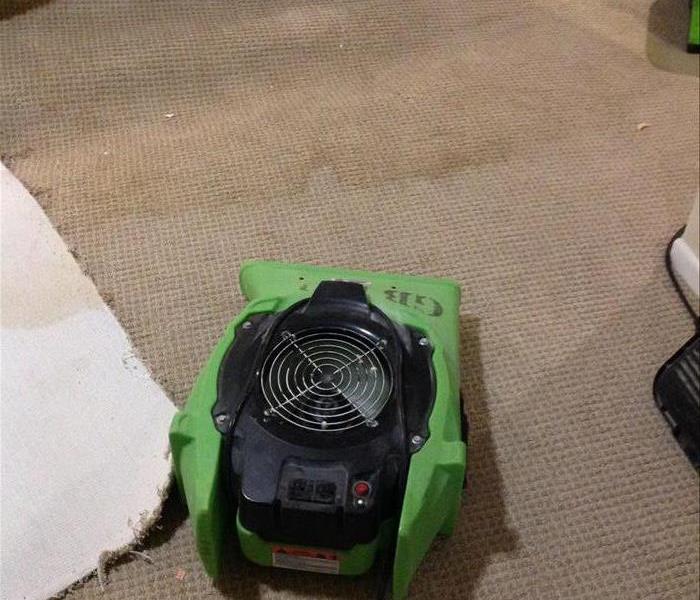 SERVPRO of Brown County provides 24-hour fire and water damage restoration service in Green Bay and the surrounding areas.
SERVPRO of Brown County provides 24-hour fire and water damage restoration service in Green Bay and the surrounding areas.
SERVPRO of Brown County is available 24 hours a day for water emergencies, large or small. When you are dealing with water damage, immediate action is crucial. A delay of just a few hours can greatly increase the severity of the water damage.
We understand that when you call us, you may be feeling confused, stressed, and vulnerable. You need an expert to guide you through this crisis. SERVPRO of Brown County has the specific water damage training and experience to help you through this tough time. We specialize in water damage restoration—in fact, it's the cornerstone of our business.
What to Expect
When you call, we will ask several questions regarding your water damage emergency. These questions will help us determine what equipment and resources to bring, including how many trained SERVPRO Professionals may be needed.
Our SERVPRO Representative will ask several questions:
- Your name and contact information
- Your insurance information (if applicable)
- The street address of the water-damaged home or business
- When did the flooding or water damage occur?
- What caused the water damage (if known)?
- Is there electricity available (on-site)?
About SERVPRO of Brown County
SERVPRO of Brown County specializes in the cleanup and restoration of residential and commercial property after a fire, smoke or water damage event. Our staff is highly trained in property damage restoration. From initial and ongoing training at SERVPRO’s corporate training facility to regular IICRC-industry certification, rest assured our staff is equipped with the knowledge to restore your property.
Do not hesitate to give us a call with any questions you may have or for our emergency services at (920) 434-8224.
How Prepared Is Your Cottage for Winter?
1/22/2020 (Permalink)
Owning a cottage as a secondary residence could come with responsibilities you may not have with your primary home. If you only frequent your place during certain times of the year, there are several things you can do as the owner to ensure a successful winterization of your property.
Although we are past the first month of winter in the Brown County area, here are a few valued tips recommended by insurance agents to cross-reference with your checklist; in case you may have overlooked an important detail.
- Shut off the water supply, drain the pipes and hot water tank, and leave taps open to allow them to breathe. Toilets should be turned off and flushed, and then any remaining water bailed out. Alternatively, pour antifreeze into the bowl to protect the lines; be sure to use RV (pink) antifreeze or another environmentally friendly product.
- Unplug all electrical appliances and electronic devices. Many modern electric and electronic devices continue to draw a small amount of power even when turned off; over a winter, it can add up to an expense you don't need.
- Thoroughly clean the kitchen and remove any food. During the winter, rodents and even bears can sniff it out. This could create a considerable amount of structural and financial damages causing you to dig deep into your wallet.
- If you can, remove valuables, such as TVs and stereos, and take them down to the city. If any valuable items left at the cottage, make sure windows are covered so that thieves can't see in and become tempted to break in, leaving your cottage exposed to those cold weather extremities.
- Install a cover over the chimney opening to prevent raccoons or other furry tenants from moving in. Inspect the exterior of the cottage, looking for other small openings that could be co-opted for an animal home – including under the deck, at the foundation, or under eaves.
- Arrange to have a local snow removal company come at least once over the winter to remove snow and ice build-up from the roof. Even a relatively small load, such as a foot or so, can become dangerously heavy if there's a period of rain followed by a freeze-up. Put boxes over vents or skylights to protect them from snow loads or accidental damage by an over-eager person with a shovel.
- Consider hiring the same company or someone to maintain the road and walkways around the cottage over winter. This allows access in case of an emergency such as a fire. Keeping the paths and driveway shoveled also makes the cottage look more lived-in, which is a security advantage.
- Hire someone or ask a friend who lives up there year-round to check on the cottage periodically to make sure everything is okay if, for some reason, you are not able to get up there yourself. If something unfortunate has happened, from a break-in to a fire, to a roof cave-in, the sooner you are made aware and can deal with it, the better.
At SERVPRO of Brown County, our business is helping people recover after any natural or human made disaster. Water recovery is one of our specialties. We know that every water damage situation is a little different and requires a unique solution, but the general process stays the same. Our trained professionals are available 24 hours a day, 7 days a week, including holidays to help take care of your emergency circumstances.
If you unexpectedly find yourself in need of our water restoration services for your cottage, feel free to call us, day or night, at 920-434-8224.
Test Your Knowledge: Frozen Pipes
12/26/2019 (Permalink)
Winter is in full swing in Brown County, which means a higher probability for frozen pipes within your home or business.
A burst pipe can be costly and time-consuming to remediate. Protect your prized personal possessions or essential business equipment from damage by preventing frozen pipes.
Do you know how to prevent pipes from freezing, or could you manage pipes that are already frozen?
Let's test your knowledge with these five questions.
- Prevent pipes from freezing by setting your thermostat no lower than:
A. 32 degrees
B. 55 degrees
C. 68 degrees
- Pipes actually freeze when the temperature reaches 32°.
True
False
- If it is extremely cold outside, you should keep water faucets running.
True
False
- When pipes freeze, they always burst.
True
False
- What should you NOT do if you suspect you have a frozen pipe?
A. Shut off the main water valve.
B. Leave faucets open until repairs are made.
C. Get a hand-held torch and start thawing the pipe.
The correct answers for this quiz are listed at the end of the blog post.
Now that you tested your knowledge of frozen pipes, here are a few more signs to look for whenever the temperature drops.
There Is Frost on the Pipe
For pipes that can actively be seen, such as those under sinks, you may be able to see frost that has accumulated on the exterior of the pipe. This can serve as a warning sign that the pipe is frozen before you ever try to turn on the faucet.
Strange Smells
Another potential sign of a blocked pipe is an odd smell coming from a faucet or drain. If the pipe is partially or entirely blocked, the only way the odor can escape is back up in the direction of your property.
Once you are aware that a pipe is frozen, act quickly to thaw the pipe. Depending on the location of the pipe and your level of expertise, you can attempt to thaw the pipe yourself. If you still feel uncertain about the process, it's best to contact a licensed plumber to thaw the pipe for you. It is imperative to thaw the pipe as soon as possible to avoid it from bursting and causing extensive damage to your property.
As a locally owned and operated business, SERVPRO of West Brown County is strategically located to respond quickly to your water damage event. Our trained technicians receive ongoing training at SERVPRO’s Corporate Training Facility to regular IICRC industry certifications to give your residential or business property the attention it deserves.
If you unexpectedly find yourself in need of our services over the holiday season, give us a call at (920) 434-8224.
ANSWERS
- 55 degrees - For most homes and businesses, setting the thermostat no lower than 55 degrees assures that warm air circulates throughout the building, protecting your pipes from freezing.
- False - No, they won’t. Pipes freeze when the heat is transferred from the water inside the pipe to the surrounding air. This means that the surrounding air temperature has to fall well below 32° for the pipes to freeze.
- True - Always keep one or two faucets running slowly. Water moving through the system should prevent the line from freezing.
- False - Pipes can freeze without bursting. You can reduce the likelihood of a frozen pipe bursting by shutting off the main water supply valve and draining the system by opening faucets throughout the house or office.
- Never use a torch, gas heater, candles, or anything with an open flame to thaw pipes.
Winter Preparations: How Prepared Is Your Business for the Cold Temperatures?
12/13/2019 (Permalink)
As a business owner, you have an array of responsibilities throughout your organization that requires your constant attention. Sometimes you forget with the many modifications continually going on in your office, other pressing matters could become problematic and cost your company production losses.
One of those commonly overlooked issues is weather preparation for your business property.
If your business is located in the Brown County region, then you know winter can create one major dilemma after another. First, it’s frozen pipes the next a backed-up toilet. Sometimes it’s an even bigger nightmare like a flooded facility.
As we enter the winter months, how prepared is your business for the freezing temperatures?
Here are some great tips offered by The Disaster Safety website on how you can prevent frozen pipes from happening in your business.
Seal openings
- Seal all windows, doors, and other openings on exterior walls with caulk or insulation to prevent cold air from penetrating the wall cavity.
Seal cracks and penetrations
- Seal all wall cracks and penetrations, including domestic and fire protection lines, electrical conduits, and other utility service lines.
Insulate and seal attic penetrations
- Insulate and seal attic penetrations such as partition walls, vents, plumbing stacks, and electrical and mechanical chases.
Insulate recessed light fixtures
- Insulate recessed light fixtures in the ceiling to reduce the heat entering the attic. Look for visible light inside the attic. If present, insulate or seal. If the space above a suspended ceiling are conditioned, there is no need for added insulation or sealing.
Run faucets
- Let all faucets drip during extremely cold weather to prevent freezing of the water inside the pipe, and if freezing does occur, to relieve pressure buildup in the pipes between the ice blockage and the faucet.
Install a monitoring system
- Install a monitoring system that provides notifications if the building’s temperature dips below a predetermined number. Never set your thermostat below 55 degrees Fahrenheit.
Insulate pipes
- Insulate pipes most vulnerable to freezing by using pipe insulation.
Install an automatic excess flow switch
- Install an automatic excess flow switch on the main incoming domestic water line to monitor and provide early detection of a broken pipe or valve. Use wireless sensors near water sources.
Monitor sprinkler systems
- Monitor sprinkler systems using a central station to provide early detection of a pipe failure and heat unheated sprinkler control rooms.
Provide backup power
- Provide a reliable backup power source, such as a standby generator, to ensure continuous power and heat to the building.
At SERVPRO, we want your business to avoid any loss. That is why our team of trained professionals is ready to take on your particular restoration situation. We know that water is particularly invasive, quickly spreading throughout your property and absorbed into floors, walls, furniture, and other items of high value. Our team is ready to start the water extraction process almost immediately.
When minutes matter, know that we are here to oversee your water loss leaving your primary focus on serving your customers with little to no interruptions in your businesses’ productivity.
If you find yourself in need of emergency services or have any questions regarding our water restoration process, give us a call at (920) 434-8224.
National Preparedness Month: Keeping Important Documents Safe from Water Damage
9/27/2019 (Permalink)
Wisconsinite's experienced severe thunderstorms throughout this summer leaving many residents stuck with the grueling job of doing house repairs themselves or filing claims with their homeowner's insurance agencies.
With the amount of flooding that took place over parts of West Brown County, both the interior and exterior parts of homes endured various levels of water damage. Sometimes the living quarters and furniture are not the only things of importance that undergo destruction. Essential documents might have become ruined as well.
As we near the end of National Preparedness Month, it is important to remember being prepared for the unexpected should be a year-long practice. One of the most vital pieces of information to your family's existence is documented mostly on legalized forms. Replacing a lost or damaged document can be rather time-consuming or in some instances, difficult if you do not have all the appropriate required documentation on hand to request new records.
The Federal Emergency Management Agency (FEMA) suggests making copies and arranging safe off-site storage for the following important documents.
Vital Personal Records
These include photocopies of personal identification such as drivers licenses, birth certificates, and Military I.D. cards, if applicable. Social Security cards, passports, and marriage licenses should also be copied.
Insurance Policies
Keep copies of your homeowner's and flood insurance policy. Also, include health and life insurance coverage information as well as contact information for your local agent.
Financial Information
Record relevant account numbers for all financial matters. Include bank contact information as well as investment firms such as brokerages, retirement accounts, and credit card companies.
Property Records
Copy the deed to your home or the mortgage documents provided by the title company. These should state the value of the house at the time of purchase. If you are a renter, retain a copy of the lease or rental agreement. Also duplicate all automobile, boat and R.V. titles and registration papers.
Medical Information
Make copies of all ongoing prescriptions plus records of immunizations, health insurance I.D. cards, and names and contact information for primary physicians. If you have a living will include that as well.
Estate Documents
Include a copy of your will, instructions for a funeral, documents for power-of-attorney designation, and contact information for your personal attorney.
Once the worst has passed and you're able to take a moment to check on all of your personal belongings for damages, remember SERVPRO of West Brown County is always here for you.
We are a trusted leader in the water restoration industry that is locally owned and operated. If you are looking to have a stress-free claim process, SERVPRO works with your insurance to help manage the insurance process and paperwork.
If you have water or flood damage, give us a call at, (920) 434-8224.
Preventing Water Damage
8/22/2019 (Permalink)
Water damage can be a frustrating event that one can experience. Although we hope you never have to experience such an event, SERVPRO of West Brown County is always ready to help you with any water damage needs you may have. We are able 24/7 365 days a year! Luckily there are a few things homeowners and business owners can do to prevent water from happening in the first place.
Inspect your roof
Your roof is constantly exposed to sunlight, rain, and many other things. You should inspect your roof regularly especially after a heavy thunderstorm. Look for shingles that are missing or loose, or any heavy wear.
Clean your gutters
You should clean your gutters regularly to ensure proper drainage. If you put off cleaning your gutters, in a worst-case scenario, your foundation could settle cracking your basement walls.
Test your sump pump regularly
Sump pumps are incredibly important devices that help keep your home safe from any water damage. You should check your sump pump at least yearly, ideally, you’d want to check your sump pump after heavy storms to ensure it is properly working.
Check for leaks
Check your pipes regularly to make sure there are no leaks. You should have your pipes repaired as soon as possible to avoid any further problems such as mold.
Bonus tip: Check your water bill
If you notice your water bill is higher than usual it might be a cause for concern. There could be a potential leak, or something is just not right. Check it out before any more damage occurs.
Call in the professionals
If water damage does happen in your home or business, rest assured that SERVPRO of West Brown County is ready to help you. We are available at any time or day, and since we’re local, we’re faster to any sized disaster!
Call us, we are here for you at (920) 434-8224.
August is Water Quality Month
8/19/2019 (Permalink)
August is national water quality. With the hustle and bustle of our everyday lives, we often don’t think about how great it is to be able to turn on the tap and have clean water run through. This month is National Water Quality month, which means it’s a perfect time to educate ourselves on how we can continue to maintain great water quality.
Use a trash can, not the sink
While you may think throwing trash in the sink is a good idea, it might not be. Avoid tossing motor oil, medical prescriptions, paint, etc. We certainly don’t want products like those in our water. Harmful contaminants can leak into our water system.
Don’t use pesticides or fertilizer
Fertilizers and pesticides can run off the soil and contaminate our waterways that provide us our clean drinking water. Being exposed to the chemicals that pesticides and fertilizers contain, can be harmful to both humans and animals.
Use the car-wash
If possible, you should avoid washing your car in your garage or driveway. Washing your vehicle in your driveway can flush contaminates down the drain and seep into our streams and lakes. Instead, you may consider washing your car through the car wash. A professional car-wash is required to drain their water to the sewage system.
Pick up pet waste
Animal waste can contain harmful bacteria. It’s important to pick up after our pets so that their waste does not run into our water supplies and drains. Instead, consider throwing your pet’s waste in a recycled plastic pet waste bag and in the trash can.
Clean up
To keep enjoying our safe and clean water, you may want to consider joining a community cleanup crew. Educate yourself and learn from others to continuing keeping our water and environment clean!
SERVPRO of West Brown County Cares
SERVPRO of West Brown County cares about our community. Whether you’ve experienced water damage or fire damage, we are here to help to make it seem “Like it never even happened.”
Flood insurance, do you need it?
7/11/2019 (Permalink)
According to the National Flood Insurance Program (NFIP), flooding is the most common natural disaster in the United States, affecting every single state. While hurricanes are mostly responsible for massive flooding disasters, other causes of flooding from outdoor sources can include snow melting and heavy rain. While many homeowner insurance policies cover flooding from sources inside your home like a broken pipe or leaky water heater, they typically do not cover flood damages from outdoor sources. It may be a wise idea to purchase a flooding insurance policy, even if your home isn’t in a high-risk area. Just one inch of flood water can cost thousands of dollars! Purchasing a flood insurance policy may save you time and money, helping you and your family recover faster.
When should I purchase a flood insurance policy?
Your home does not need to be in a high-risk area to experience flooding. Floods can happen anywhere. More than 20 percent of flood claims come from properties outside the high-risk flood zone. It is wise to look at your neighborhood and talk to longtime residents about the frequency of flooding. If there is a pattern that is concerning, it may be a good investment to obtain a flood policy. So, when exactly should you purchase a flood insurance policy? A flood insurance policy typically takes 30 days to go into effect. Any damages that occur before the 30 days, will not be covered. Essentially, now is the right time to purchase a flooding policy if you need one.
What is covered by a flood insurance policy?
A flood insurance policy covers outdoor flooding sources on two types of property: the structure of your home and the contents within it. Remember, each has their own deductibles. The coverage for the structure of your home typically includes:
- Water heaters
- Electrical and plumbing
- Central air systems and furnace
- Foundation
- Refrigerators, cooking stoves and built-in appliances, etc.
- Damage done to walls and floors etc
Contents covered under your flood insurance policy can include:
- Furniture
- Clothing
- Electronics
- Washer/dryer
- Curtains, wall hangings, and other personal items.
How Do I buy flood insurance?
Speak with your insurance agent, to learn more about the government assisted flooding insurance and private insurance policies. Your insurance agent well know what insurance policy is best suited for your home or business.
SERVPRO of West Brown County is ready to cleanup water damage
Cleaning up water damage is critical to prevent any mold growth and further damages. Hiring a professional company can make things easier for residential and commercial property owners. Here at SERVPRO of West Brown County, we pride ourselves with being able to handle any-sized disaster, both commercial and residential. Call us today! (920) 434-8224.
Green Bay area residents: we provide immediate service day or night!
4/3/2019 (Permalink)
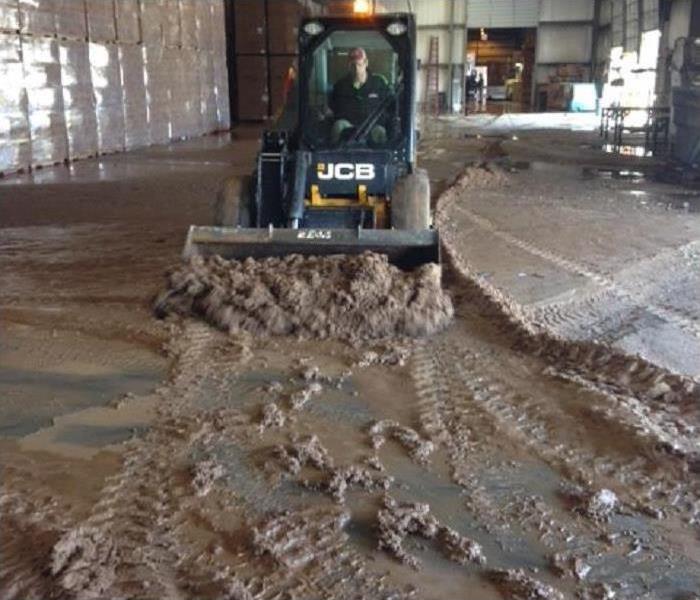 We helped clean up this commercial property after flooding in the Green Bay area.
We helped clean up this commercial property after flooding in the Green Bay area.
SERVPRO of West Brown County provides 24-hour emergency service and is dedicated to being faster to any-sized disaster in the Green Bay area. We can respond immediately to your emergency and have the expertise to handle your restoration or cleaning needs.
- 24-Hour Emergency Service
- Faster to Any-Sized Disaster
- Highly Trained Restoration Technicians
- A Trusted Leader in the Restoration Industry
- Locally Owned and Operated
- Advanced Restoration and Cleaning Equipment
Have Questions? Call Us 24/7 – 920-434-8224
Residential Services
Whether your Green Bay area home needs emergency flood damage or your upholstery cleaned, you can depend on us. Our technicians have extensive cleaning and restoration training and can make your property look its best. Learn more about our residential services:
- Water Damage Restoration
- Fire Damage Restoration
- Mold Remediation
- Storm Damage Restoration
- Cleaning Services
- Building/Reconstruction Services
Commercial Services
There's never a convenient time for fire or Water damage to strike your Green Bay area commercial property. Every hour spent cleaning up is an hour of lost revenue and productivity. So when the need arises for professional cleaning or emergency restoration services we have the training and expertise to respond promptly with highly trained technicians to get your property back to business.
Green Bay Area Residents: We Specialize in Flooded Basement Cleanup and Restoration!
3/13/2019 (Permalink)
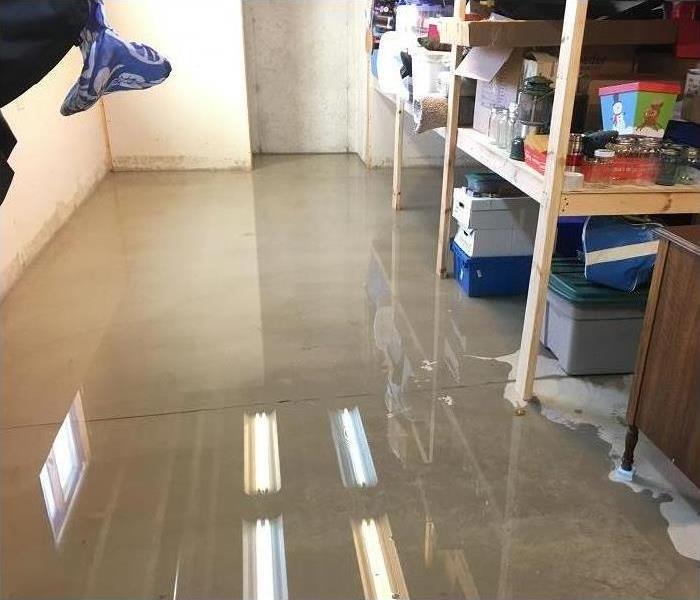 This basement in the Green Bay area flooded after snowmelt sent water gushing into the basement windows.
This basement in the Green Bay area flooded after snowmelt sent water gushing into the basement windows.
A basement can flood at any time, although flooding most often occurs during heavy rainfall. Basements are inherently prone to flooding because they are the lowest level of a building and are normally built partly or entirely below ground level. There are a number of reasons why your Green Bay area basement could flood, including:
- A blocked or failed sewer lateral pipe
- Heavy rain causes surface water to pool around your home
- Storm sewer backup
- Sanitary sewer backup
- Foundation drainage failure
- Water supply-line break or hot-water tank failure
- And many more
Have Questions about Basement Flooding?
Call Today - 920-434-8224
If flood water is not handled quickly and properly, it can jeopardize your health and safety, and cause severe damage to your home’s structure. Remember, the longer you wait, the worse the problem will get.
The bottom line: a flooded basement can jeopardize your health, safety, and your home’s integrity. It’s worth making a call to SERVPRO of West Brown County and let our trained, professional crews handle the situation safely and correctly. We have earned the trust of hundreds of homeowners, business owners, and property professionals.
We are Flooded Basement Specialists:
- We are Available 24 hours/7 days per week
- We’re a Preferred Vendor to many National Insurance Companies
- We Bill The Insurance Directly – One Less Thing For You To Worry About
- Our Technicians are Highly-Trained in Water Restoration Techniques
- We use s500 IICRC Restoration Standards
- Advanced Inspection and Extraction Equipment
Basement Flooded? Call Us Today – We’re Ready To Help 920-434-8224.
Team SERVPRO of West Brown County is "Faster to Any Size Disaster"
2/26/2019 (Permalink)
We have a saying here at SERVPRO of West Brown County, that we’re, “Faster to any size disaster.”
Well, to be fair, this is a saying the ENTIRE SERVPRO franchise system lives by, but that fact only adds to the importance of the overall message: no matter where you are, if you need our help, we will be there for you ASAP.
If your home floods in the middle of the night, or you have a business fire on a holiday and need board up services, we will be there for you.
There is always someone to answer our phones, 24 hours a day, 7 days a week, 365 days a year. If you have an emergency, we always have a team of highly-trained, expert technicians on call. They will come to you when you need them for any disaster large or small.
And because SERVPRO itself is a large system, with more than 1,700 franchises nationwide, we can be there when needed for large-scale disasters as well.
If a natural disaster causes widespread damage across the Green Bay area, our team will be there to help, but we can also call on other teams from around the country to come in and help as well. We are able to share manpower and equipment when the situation is dire.
In that same way, our local techs will sometimes go to other areas to help out when there’s a great need.
The goal is to help people get their lives back to normal as quickly as possible, while providing the very best service.
Don’t forget, we offer help for cleanup after floods, fires, storms, mold and biohazard events. We can help with disasters large and small, because we know what even a “small issue” can seem very large when you’re the one living through it.
Call us when you need us at 920-434-8224, because we are the ones who are “Faster to any size disaster.”
The Danger of Ice Dams
1/23/2019 (Permalink)
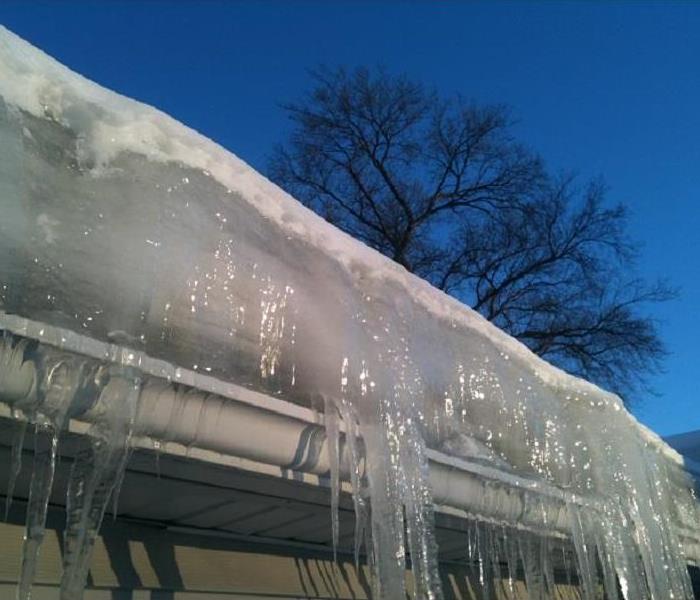 Ice Dam
Ice Dam
This time of year, icicles can certainly make for a lovely sight hanging off gutters and roofs. However, those shimmery shards can be a sign of something serious: ice dams.
Ice dams are solid ridges of ice that form along the eaves of your home and can form on your roof during cold, snowy weather in the same way icicles do. Those dams can cause major damage to your roof, sometimes tearing off shingles and gutters. They can also force water to back up and spill into your house, causing water damage to your property.
Ice dams are created when heat from your home keeps much of your roof warm. That heat, however, does not extend to the eaves of the roof and those stay cold. So, when it snows, the snow will melt on the area of the roof that is warm and then that melted snow freezes on the cold eaves. That is an ice dam. And then, when it snows again, the snow will melt again on the warm part of the roof and then back up behind the ice dam, sending water under the shingles and into your home.
We don’t have to tell you what happens when water floods into your home. It’s not good.
If you’ve noticed ice dams forming on your roof, there are some quick fixes you can try to prevent damage.
We got these tips from thisoldhouse.com:
- First, you can rake the ice and snow off your roof using an ice rake.
- You can purchase heated cables and attach them to the eaves of your roof to melt the ice that’s formed there.
- Blowing cold air onto your roof is also an option. You can place a box fan in your attic and aim it at the warmer parts of the roof to keep them cooler.
- You can also try to de-ice the eaves by filling pantyhose with ice melt and placing them on the icy areas of the roof.
These are just quick fixes for ice dams, but there are also steps you can take to solve the problem long term. If you notice ice dams have formed on your roof, you should take photos of the troubled areas of your roof and attic and show them to a professional roofer. They will be able to help you figure out what to do to prevent the dams in the future.
And if you have an issue with ice dams that have sent water into your home, SERVPRO of West Brown County can clean up the mess. Call us at 920-434-8224.
Winter Prep Profile: Preventing Frozen Pipes
12/12/2018 (Permalink)
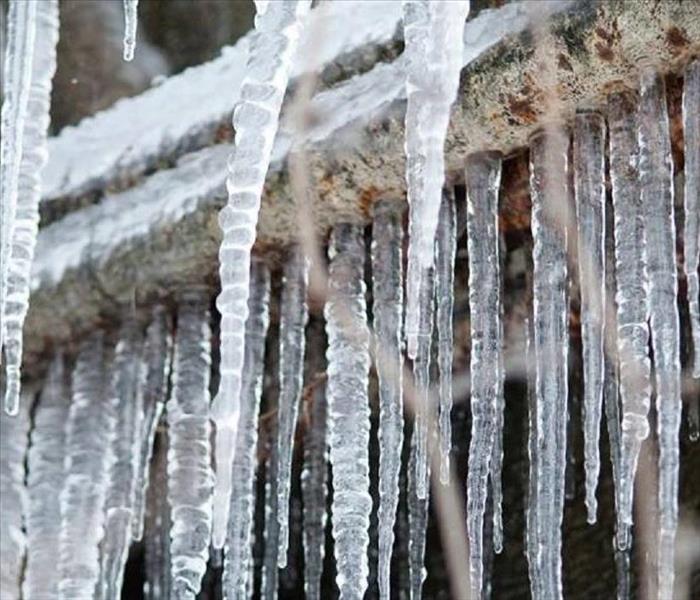 Photo of a frozen pipe courtesy of the American Red Cross.
Photo of a frozen pipe courtesy of the American Red Cross.
In last week’s Winter Prep Profile Team SERVPRO of West Brown County gave you a rundown of steps you can (and should!) take to prepare your home and/or business for the winter weather to come. One of the most important of those steps is preventing your pipes from freezing!
And, as we said last week, this is such an important step, we feel it deserves its very own profile.
As you probably know, freezing weather makes water freeze and when water freezes it expands. That means if water freezes in a pipe, whether that pipe is made of metal or plastic, that frozen water can be strong enough to break that pipe. And if a pipe breaks, that can lead to serious consequences like flooding and water damage in your home or business.
SERVPRO of West Brown County does not want to see you experience any of that damage this winter. So, we’re sharing the American Red Cross’s advice for preventing frozen pipes. First, here’s a list of the pipes the Red Cross says are most likely to freeze:
- Any pipes that are outside and exposed to severe cold. These include outdoor hose bibs, sprinkler lines and swimming pool supply lines.
- Water supply pipes in unheated interior areas like basements and crawl spaces, attics, garages, or kitchen cabinets.
- Pipes that run along exterior walls with little or no insulation.
To prevent these pipes from freezing the Red Cross advises the following:
- Drain water from swimming pool and water sprinkler supply lines following manufacturer's or installer's directions. Do not put antifreeze in these lines unless directed.
- Remove, drain, and store hoses used outdoors. Close inside valves supplying outdoor hose bibs. Open the outside hose bibs to allow water to drain. Keep the outside valve open so that any water remaining in the pipe can expand without causing the pipe to break.
- Add insulation to attics, basements and crawl spaces.
- Check around the home for other areas where water supply lines are located in unheated areas. Look in the garage, and under kitchen and bathroom cabinets. Both hot and cold water pipes in these areas should be insulated.
- Keep garage doors closed if there are water supply lines in the garage.
- Open kitchen and bathroom cabinet doors to allow warmer air to circulate around the plumbing.
- Consider running water (even a drip) through faucets served by exposed pipes on extremely cold days.
- Keep the thermostat set to the same temperature both day and night.
- If you leave for an extended period of time, keep your thermostat at at least 55 degrees.
According to the Red Cross, if you turn on a faucet and only a trickle comes out, you likely have a frozen pipe. You can try to fix the problem by taking the following steps:
- Keep the faucet open. Running water will help thaw the pipe. You will also be able to tell when the problem is fixed when water starts running normally again.
- Apply heat to the section of pipe using an electric heating pad wrapped around the pipe, an electric hair dryer, a portable space heater (kept away from flammable materials), or by wrapping pipes with towels soaked in hot water. DO NOT use a blowtorch, kerosene or propane heater, charcoal stove, or other open flame device.
- If you cannot find the frozen area or fix the problem on your own, call a licensed plumber right away.
- If you have one frozen pipe, check other faucets in your home to see if you have others.
And remember, if worse comes worst and you do experience a frozen pipe that leads to water damage at your home or business, you can call us any time, 24 hours a day, 7 days a week (even on holidays!) at 920-434-8224.
Winter Prep Profile: Your Home or Business
12/5/2018 (Permalink)
We’re officially into December and with a new month, comes new Profile Friday subjects!
This month we’re focusing on how you can prepare for the deep winter months to come.
At this point, we’re not even officially into winter yet, but we’re already experiencing wintry conditions. So, it’s good to take the necessary precautions now before conditions get worse.
In this profile, we’re going to talk about steps you can take to ensure your home and/or business is ready for the season. (Most of this advice can be used in either your home or business!)
The American Red Cross recommends the following advice:
- Protect your pipes from freezing (this is such an important step, we’re going to do an entire blog on it in our profile next week!)
- Make sure your home heating sources are installed properly and are clean and in good, working condition.
- Make sure your home is properly insulated.
- Caulk or weather-strip any drafty doors or windows.
- Install storm windows.
- Consider buying back up heating sources like a wood stove or space heater. Make sure those heating sources are properly cleaned and maintained.
- Make sure to keep extra fuel for heating sources on hand in case of storms. (But, make sure to take caution with extra fuel sources to protect against fires.)
- Consider installing a portable generator.
- Ensure you have carbon monoxide detectors installed on every level of your home and in every bedroom.
- Consider buying flood insurance. Flood insurance is not part of a home-owner’s policy, but is purchased through the National Flood Insurance Program.
- Clean your gutters.
- Look for loose tree limbs and other debris in your yard that could be blown around during a storm and get rid of them so they don’t cause damage to your property.
- Make sure your sump pump is working.
It’s also a good time to remind you about Winter Storm and Blizzard Warnings. According to the Red Cross, a Winter Storm Warning means that life-threatening, severe winter conditions have begun or will begin in the next 24 hours. The Red Cross says a Blizzard Warning means there will be sustained winds or frequent gusts of 35 miles per hour or greater, plus considerable falling or blowing snow reducing visibility to less than a quarter mile, expected to prevail for three hours or longer.
If severe weather is in the forecast, make sure to prepare your home with the supplies you need to ride out the storm. It’s also a good idea to stay home during bad weather if you can! If you must be on the road, take precautions and look out for our winter prep profile about safety in your car!
Preparedness Profile: Emergency Finances
9/26/2018 (Permalink)
 It's a good idea to have an emergency "piggy bank."
It's a good idea to have an emergency "piggy bank."
For our final Preparedness Profile as September (AKA National Preparedness Month) comes to an end, we’d like to talk to you about emergency finances.
Being ready for a disaster doesn’t just mean having a plan in place, or creating an emergency kit, it means making sure your bank account and insurance policies are ready if worse comes to worst.
Having your finances in place is so important, because disasters can be devastating financially. For example, Ready.gov, says that just one inch of water in your home during a flooding situation can cause $25,000 worth of damage.
Now, it’s unlikely that you have (or can get) a spare $25,000 in your bank account on short notice and that’s why it’s so important you make sure you have any insurance coverage you might need. Have a conversation with your insurance agent about your policy. What possible holes exist in your coverage? What might you need if disaster strikes?
There are a lot of unknowns when it comes to insurance that only a professional can help with. For example, did you know that most homeowners’ and renters’ insurance does NOT cover flood damage? You often need an additional flood insurance policy. Even if you don’t live near a body of water, the experts say, anywhere it rains it can flood.
In addition to having the right insurance coverage, it’s also a good idea to have SOME money set aside for a disaster, or emergency situation. This will ensure you can still care for your family if something prevents you from working.
Ready.gov advises putting aside a little bit of money each month in a savings account that is only to be used in case of emergencies. The website also advises you have any paychecks or benefit checks directly deposited into your bank account to ensure you continue to receive your money in the midst of any disasters.
In addition, Ready.gov has a list of identifying and financial documents you’ll want copies of in case of emergencies. Those documents include:
- Photo ID
- Birth certificates for all household members
- Social Security card
- Any military ID
- Pet ID tags
- Housing payment records
- Insurance policies
- Proof of income
- Tax documents
- Health records
- Health insurance documents
- Immunization records
- Prescriptions
It’s likely no surprise disaster situations can be costly, but if you plan ahead you can offset those costs and ease any burdens that might come your way.
An Introduction to Document Drying
7/10/2018 (Permalink)
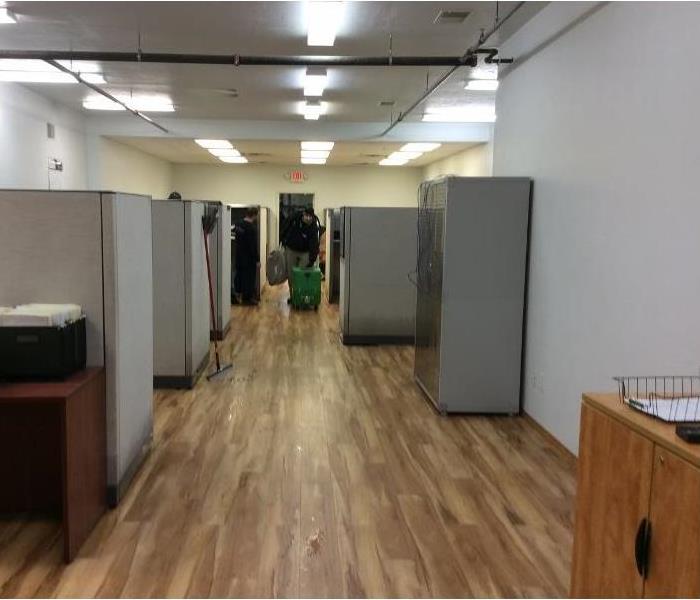 An office in the Green Bay area that experienced a broken sprinkler.
An office in the Green Bay area that experienced a broken sprinkler.
When a business experiences flooding, the work flow can be thrown completely out of whack. The facilities, floors and furniture may be wet AND so might important documents and paperwork.
To help get your business back to work as fast as possible, SERVPRO is able to offer document drying services.
Our team is capable of drying content of all kinds including:
- paper documents
- books and magazines
- manuscripts and files
- photographs, films, negatives, and microfiche
- x-rays
- blueprints and maps
- parchment
How do we do it? We use state-of-the-art technology, that’s how. That includes using the same freeze-drying methods used by the Library of Congress to dry valuable historic documents and books. Our vacuum freeze-drying process is the only method approved by the National Archives and Records Administration (NARA) and the General Services Administration (GSA).
The freeze-drying process is done at SERVPRO’s corporate facility in Tennessee. Our local franchise team would send your documents there securely, packaged with dry ice. Once they arrive at the facility, the documents are handled by The Document Restoration Team. They are highly trained in the vacuum freeze-drying technique. The team is also HIPPA Master certified, so you can trust them with any sensitive information your documents might include. It takes about 7 to 10 days to dry everything out.
The SERVPRO team can also disinfect and sterilize any documents we dry too. We do that by using a process called gamma irradiation. Gamma irradiation is the same process used to sterilize certain medical equipment.
In addition, SERVPRO is able to digitize any documents that we dry. That way you won’t have to worry about those contents being lost or damaged in the future.
This service is NOT just for businesses. If you’ve experienced a water loss or flooding in your home we can help dry and restore any important papers or beloved photos that might have gotten wet.
If you should ever need document drying, SERVPRO of West Brown County is just a phone call away. Just dial 920-434-8224, any time day or night!
Water Damage Timeline
6/4/2018 (Permalink)
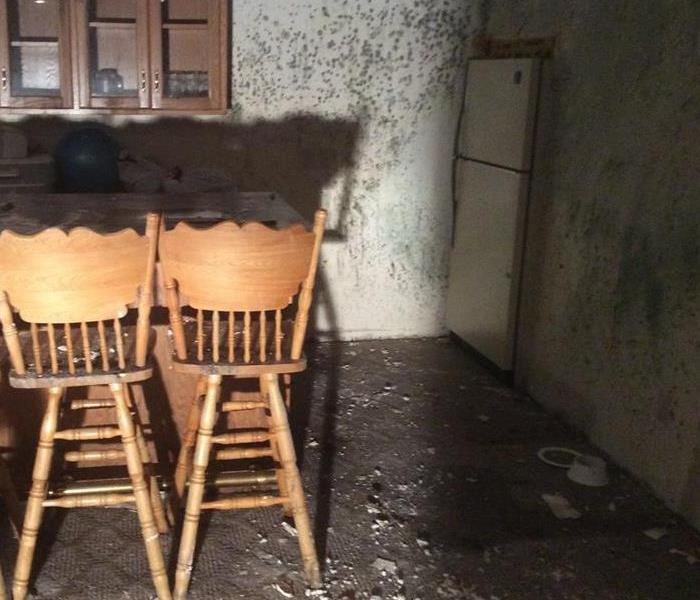 Water damage at a home in the Green Bay area
Water damage at a home in the Green Bay area
When flooding or water damage happens at your home or business, time is of the essence. The faster you call team SERVPRO for help, the less damage that unexpected water will be able to do.
According to the American Insurance Association, 37% of all homes will suffer water damage each year. Of the water damage that occurs, the association says 93% of that damage is preventable. According to the association, the first 24 to 48 hours are the most crucial when dealing with water damage.
SERVPRO has a timeline that lists the damage you can expect following a flood or water loss:
Within Minutes
- Water quickly spreads throughout your property, saturating everything in its path.
- Water is absorbed into walls, floors, upholstery, and belongings.
- Furniture finishes may bleed, causing permanent staining on carpets.
- Photographs, books, and other paper goods start to swell and warp.
Hours 1 - 24:
- Drywall begins to swell and break down.
- Metal surfaces begin to tarnish.
- Furniture begins to swell and crack.
- Dyes and inks from cloth and paper goods spread and stain.
- A musty odor appears.
48 Hours to 1 Week:
- Mold and mildew may grow and spread.
- Doors, windows, and studs swell and warp.
- Metal begins to rust and corrode.
- Furniture warps and shows signs of mold.
- Paint begins to blister.
- Wood flooring swells and warps.
- Serious biohazard contamination is possible.
More Than 1 Week:
- Restoration time and cost increase dramatically; replacing contaminated materials and structural rebuilding may be extensive.
- Structural safety, mold growth, and biohazard contaminants pose serious risks to occupants.
The message here is that if water ends up where it does not belong, you should NOT WAIT to call for help. Getting someone on the scene ASAP will only save time and money in the long run.
We’ve heard before that people will sometimes not even realize they’ve experienced a water loss until days, maybe even weeks later. For example, they may have a basement they don’t go into very often that floods. So, we recommend checking those isolated areas on a regular basis and after any major weather event, like torrential rains.
There are some steps you should also take while waiting for help to arrive. SERVPRO recommends as follows:
- Stop the source of the water: if, for example, you have a broken pipe, make sure to turn off the water supply to prevent anymore leaking.
- Remove items of value: move any valuables and furniture away from the water, to prevent permanent damage to those items.
- Prevent the spread of moisture: as best you can, try to soak up any water by toweling or mopping the area. This will be a good temporary help. (Only do this if the water is clean!)
- Take notes and photos for your insurance company.
- Stay Safe! Make sure to turn off any electrical connections that could pose a danger in the flooded area. DO NOT mop or towel up any water that may be contaminated, if it came from a sewer backup, for example.
As we have said, time is not on your side when it comes to water damage. So, the sooner you call for help, the better!
You can always contact us a SERVPRO of West Brown County at 920-434-8224. We’re faster to any size disaster!
On the Scene of a Water Loss
5/29/2018 (Permalink)
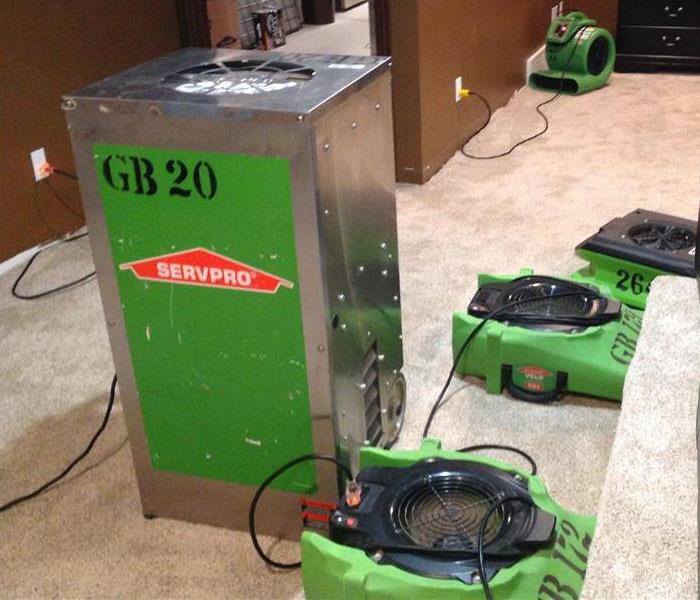 Water loss scene
Water loss scene
A very common call in our line of work is for water in basements.
And a very common way water gets into basements is when sump pumps stop working for various reasons. Broken sump pumps allow ground water to rise and seep into the cracks in the concrete floors. So, often, you’ll notice water does not come up evenly, but tends to gather in certain areas where the foundation is lower.
We recently had a call for a broken sump pump and water loss in a finished basement in a home in the Green Bay area.
The first step we take when this happens is to go to the home and assess the damage. We inspect the situation, see what’s gotten wet and speak with the client about what we’ll do to remediate the water loss and what they can expect when it comes to the process, insurance and the work in their home.
After that our team gets to work.
In this recent situation, the finished basement had several rooms that were carpeted, as well as storage rooms that were not.
The first move the technicians made was to get any furniture and personal belongings moved off the wet floor and carpeting. They blocked up anything that got wet from being in contact with the wet floor to allow it to dry.
The next step was to do what’s called ‘extraction’ on the carpeting. That means using a machine to, in a sense, vacuum water up out of the carpet. (It is a labor-intense process, but very important to kick start the drying!)
After that, the technicians pull up the edges of the carpeting and then rolled the carpeting back to expose the padding underneath. They then cut out and removed all of the wet padding, throwing it away. This is because according to IICRC standards, sump water is contaminated water and is considered category 2 water. The standards say the carpeting can be cleaned and disinfected but the pad cannot be and needs to be replaced.
Once the padding was gone, the technicians put an antimicrobial spray on the floor to kill any germs or bacteria that may have been left behind by the water. Afterward, they rolled the carpet back down across the floor, extracted the carpet once more to make sure as much water is removed and then put antimicrobial spray on top of the carpet.
The technicians repeated this process several times over in several carpeted rooms in the basement.
They also removed the baseboards from walls that were affected by the water. ¾” holes are then drilled in the drywall every few inches where the baseboard was. That ensures that walls will dry fully and mold has nowhere to hide and grow in the future. These holes will later be covered fully when the baseboards are reapplied to the drywalls.
Finally, the techs set up dehumidifiers and fans to really get the drying process going. They did a process called “floating the carpet,” where they put a few fans blowing underneath the carpeting, making it float and flutter slightly. This helps the drying process along more quickly.
The drying process can take several days to complete and our team will go back to monitor the process. When they monitor, the techs use equipment to measure the temperature and humidity in the room to see how things are coming along. They also directly measure the moisture content in affected wood and drywall to determine when the materials have reached dry standards.
Once the drying process is complete in any water loss case, the SERVPRO team will put the property and belongings back together. We are also able to provide reconstruction services for anything that needed to be torn out during the remediation, like the pad in this recent case as well as having the carpet re-stretched in place and the baseboards reapplied to the walls.
SERVPRO of West Brown County is just a phone call away (920-434-8224) if you need our help following a water loss at your home or business. Give us a call anytime!
Navigating the Waters of Flood Safety
5/14/2018 (Permalink)
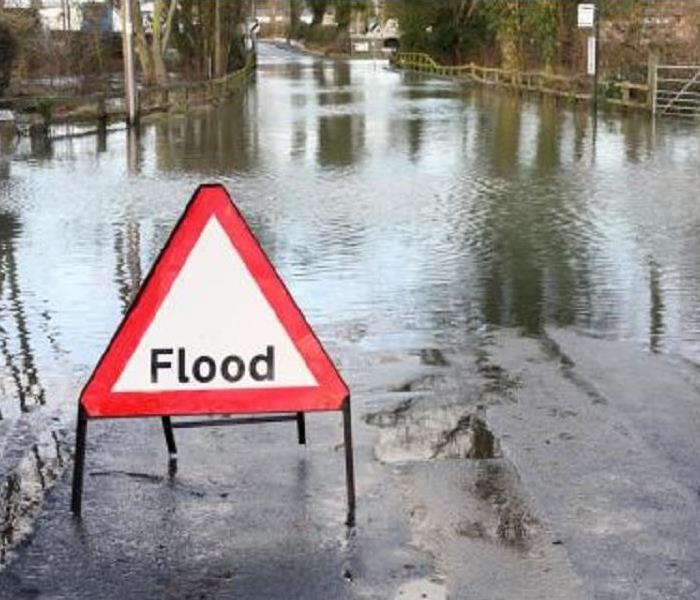 Flooding photo courtesy of Wisconsin DHS
Flooding photo courtesy of Wisconsin DHS
Spring showers can bring a lot more than flowers this time of year. Depending on where you live those showers can also bring floods.
And just because it’s never flooded where you live before does NOT mean it can’t or won’t happen in the future.
According to Ready Wisconsin, flood risk is based several factors. Those include:
- Rainfall
- River Flow
- Topography
- Flood-control measures
- Any changes due to building and development
So, depending on all of that, even if your property has been safe in the past, something could happen to put your home or business in danger of flooding.
FEMA advises buying flood insurance for just this reason. According to FEMA:
- One inch of water in a home can cause $25,000 worth of damage.
- Homeowners and renters insurance do not typically cover flooding.
- More than 20% of flood claims come from properties outside high-risk flood zones.
Ready Wisconsin says a typical flood insurance policy will cost you about $700 a year, but that will, of course, depend on your location and the risk for flooding.
Now that we’ve talked about insurance to protect your property, let’s talk about protecting yourself.
Please remember to be safe if flooding is in the forecast and you’re going to be out and about. According to the CDC, over half of all flood-related drownings happen as a result of vehicles being driven into flood waters. AND, the CDC says, the next most common reason for flood-related drownings is when people walk into or near flood waters.
The experts advise staying away from all kinds of flood waters and any barriers or signs warning about flooding. It’s not worth the risk.
According to Ready Wisconsin, as little as six inches of rushing water can knock over an adult, and as little as two feet of rushing water can sweep away a vehicle as large as a pickup truck or SUV.
So, remember, take care of yourself and your property when floods are in the forecast.
And, as always, if a flood should affect your home or business, we at SERVPRO of West Brown County can help in the recovery process. You can reach us at 920-434-8224.
Keep Your Sump Pump Performing
4/19/2018 (Permalink)
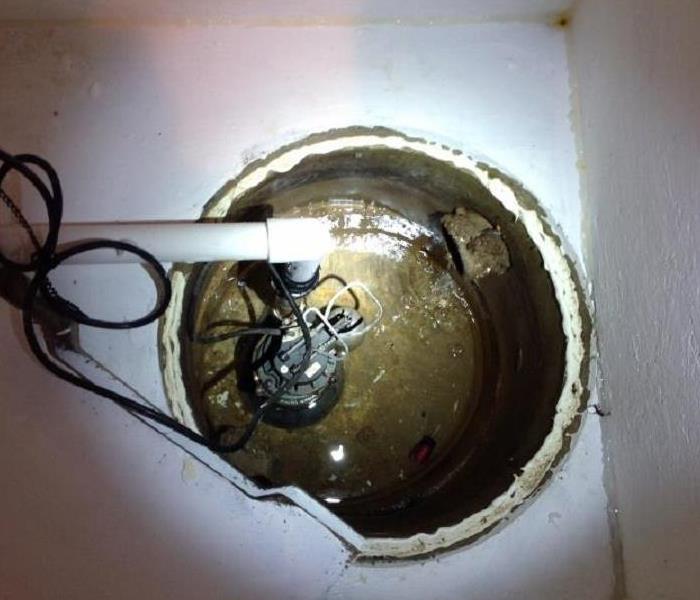 Photo of a sump pump failure from a home in the Green Bay area
Photo of a sump pump failure from a home in the Green Bay area
Only a week after experiencing an APRIL blizzard, Northeast Wisconsin is enjoying a warm up. And as about two feet of snow starts to melt rapidly, we at SERVPRO of West Brown County have been busy.
One issue that’s come up from several clients over the last few days is sump pump failure. When a sump pump fails, that can lead to water in your basement and other parts of your home. That rogue water can go on to cause property damage.
So, we thought now might be a good time to put out some friendly reminders about sump pumps!
First, what exactly is a sump pump?
Well, a sump pump, is exactly what it sounds like. It’s a pump that’s often connected to your home’s electrical system. The pump is used to remove any water that collects in your home’s sump basin. The sump basin is typically in your basement to collect any water that makes its way inside thanks to issues like rain or ground water.
If the pump fails for whatever reason, any water that collects in the sump basin can eventually overflow into the basement and beyond. Because of that, some of the pumps come with battery-powered back-ups. HOWEVER, they don’t all have back-ups!!
And now is the moment we encourage you to check your sump pump to ensure it’s working properly! Here’s what you need to look for or do:
- If it’s running and seems to be running smoothly, that’s good!
- If the sump pump is not running, look a little closer to make sure it’s in good condition:
- Make sure the pump is upright.
- Check for any signs of damage, wear, or tear.
- Clean any dirt or debris out of the sump pit.
- You can test the pump by pouring a bucket of water into the pit. If the pump activates and the water drains quickly you’re in good shape.
- If the pump does not activate or appears damaged in anyway, fix it or call for maintenance right away.
Now that you’re back from checking your sump pump, if you’ve found it quit on you leaving water where it doesn’t belong, give us a call. We are here for you at 920-434-8224!
If everything is in order, that’s great news! Enjoy the warm weather!
Either way, experts recommend giving your sump pump a checkup once a year, but it certainly can’t hurt to do so more often if rain storms, snow melts, or any surprise spring blizzards are in the forecast
IICRC: A Certification You Can Trust
4/16/2018 (Permalink)
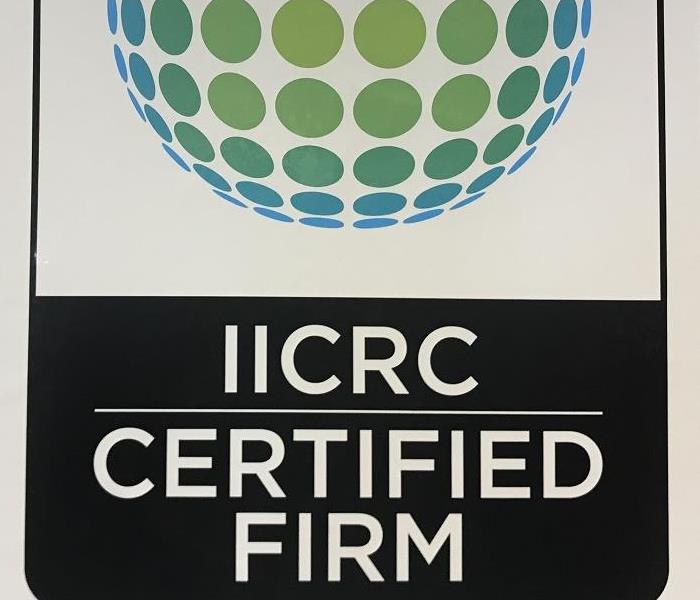 Our IICRC Certification Plaque.
Our IICRC Certification Plaque.
At SERVPRO of West Brown County we are an IICRC Certified Firm. You may not know what that means just yet, but it’s a big deal when it comes to the work we do.
Here’s why:
IICRC stands for Institute of Inspection, Cleaning and Restoration Certification. It is an international, not-for-profit organization that sets the standards for “technical excellence” in our field.
The IICRC covers all aspects of the work SERVPRO does, including: fire restoration, water damage restoration, mold remediation and inspection, as well as floor and upholstery cleaning.
To become IICRC certified a firm like ours needs to employ a certain number of certified technicians AND the owner needs to be certified as well.
For an individual to become certified they need to attend classes in person then take and pass tests from the organization.
The IICRC has become so trusted in this industry, because it creates the standards we need to work under by gathering peer-reviewed, industry-accepted best practices from around the world to ensure certified technicians are working as safely and efficiently as possible.
We’re at a point where some insurance companies will refuse to work with firms that are not IICRC certified. That’s how important this is.
Our IICRC certification means you can rest assured in the knowledge that SERVPRO of West Brown County will do the best, safest work for you, at the best price and in a timely manner.
We are available any time day or night if you need us for help following a fire, flood, storm or mold growth in the Green Bay area. We’re also here if you need help cleaning up your home or office. Call us at 920-434-8224.
Water Damage By the Numbers
4/12/2018 (Permalink)
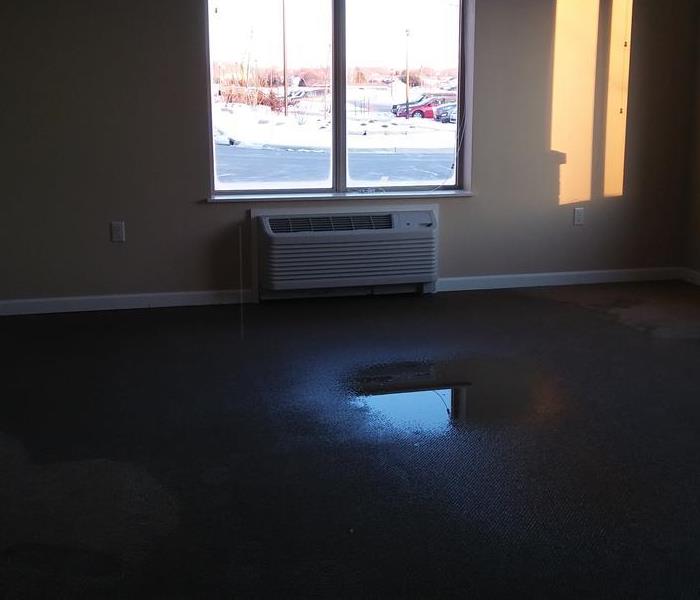 A photo of a water damage situation our team at SERVPRO of West Brown County handled.
A photo of a water damage situation our team at SERVPRO of West Brown County handled.
At SERVPRO, we are prepared for any kind of water damage or flooding you might experience at your home or business.
However, not all water damage situations are created equal. There are several categories that these situations can fall into that determine how dangerous they are to you and to our teams doing the cleanup. They also determine the amount of work needed to do the mitigation. It’s important you know what we mean when we talk about these categories if you ever have a water damage situation of your own.
So, let’s consider the categories:
Category 1: “Clean Water”
- Clean Water is any water that comes from a sanitary water source.
- Clean Water does not post any substantial risks to people’s health.
- An example of Clean Water would be any leaking from a water supply pipe.
Category 2: “Gray Water”
- Gray Water is water that contains significant contamination.
- Gray Water has the potential to cause people discomfort or sickness.
- Some examples of Gray Water are leaks from washing machines, dishwashers and water beds.
Category 3: “Black Water”
- Black Water is water that is grossly, or extremely contaminated.
- Black Water can contain pathogens, toxins or other harmful materials.
- Black Water can make people seriously ill.
- Some examples of Black Water are sewage backups, flood waters, and backups from a toilet trap.
Outside of the three main categories there are also special situations where an expert besides SERVPRO might need to aid in clean up. Those special situations include water leaks or losses that contain regulated or hazardous materials like mercury, lead, asbestos, pesticides and fuels.
When it comes to those three main categories, SERVPRO of West Brown County is prepared to help you recover from whatever loss might occur. For the more serious categories our team members will need to wear protective gear, because those categories can be very dangerous to people’s health. Depending on the situation our team members will use different methods to clean up, like using antimicrobial products to ensure the environment is safe.
It’s very important for you to know that a category can change over time. For example, a Category 1 can turn into a Category 2 if the water sits around for a day or more or even a category 3 if it sits for more than 3 days or mixes with certain building materials or very dirty situations.
So, if you have any unwanted water issues, it’s best to reach out to us for help ASAP to keep damage and costs at a minimum. You can do that by calling us at 920-434-8224 24 hours a day, 7 days a week.
SERVPRO of West Brown County Dries Your Home or Business with Science
4/12/2018 (Permalink)
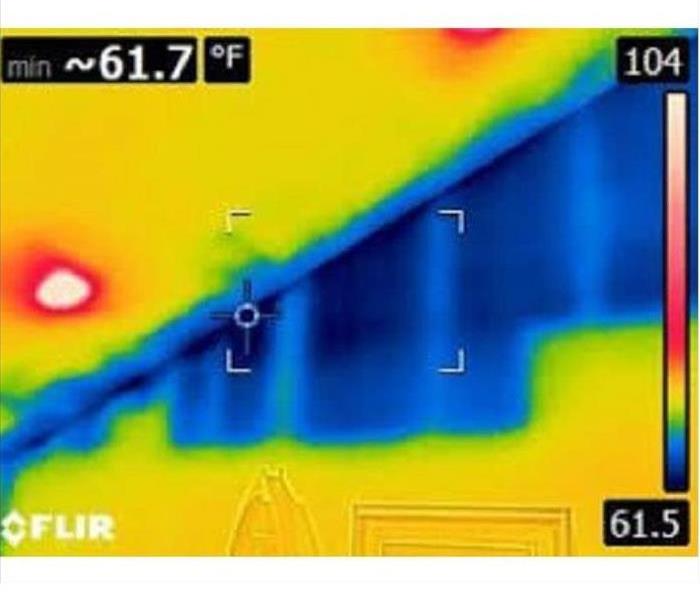 Drying your home or business with science!
Drying your home or business with science!
Did you there is actually a science behind the drying process? Having the knowledge of psychrometrics is essential to restoring a water-damaged structure to its preloss condition. While your initial reaction may be to grab a few towels to mop up the mess and place a fan or two around the damaged area, SERVPRO professionals are trained in the science of drying and follow strict industry-approved standards to help lower the chances of any secondary damages. These processes include inspecting the building to detect every component that is wet, measuring how much moisture is in the wet materials, monitoring whether the materials are drying properly and speeding up Mother Nature by using professional drying equipment.
The bottom line is SERVPRO of West Brown County has the training and equipment to help make water damage "Like it never even happened." Call SERVPRO of West Brown County at 920-434-8224.
Green Bay 24 Hour Emergency Water Damage Service
8/14/2017 (Permalink)
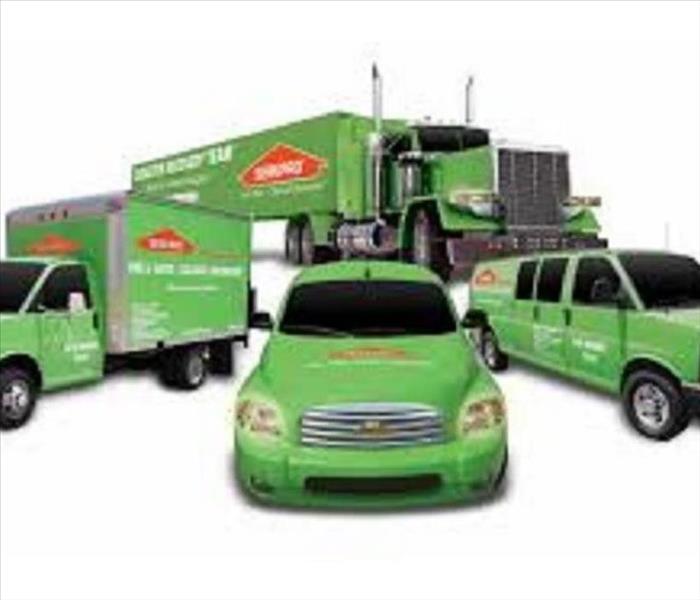 SERVPRO of West Brown County provides 24 hour fire and water damage restoration service in Green Bay
SERVPRO of West Brown County provides 24 hour fire and water damage restoration service in Green Bay
SERVPRO of West Brown County is available 24 hours a day for water emergencies, large or small. When you are dealing with water damage, immediate action is crucial. A delay of just a few hours can greatly increase the severity of the water damage.
We Answer the Phone Ready to Help 24/7/365
Call Today - 920-434-8224
We understand that when you call us, you may be feeling confused, stressed, and vulnerable. You need an expert to guide you through this crisis. SERVPRO of West Brown County has the specific water damage training and experience to help you through this tough time. We specialize in water damage restoration—in fact, it's the cornerstone of our business.
What to Expect
When you call, we will ask several questions regarding your water damage emergency. These questions will help us determine what equipment and resources to bring, including how many trained SERVPRO Professionals may be needed.
Our SERVPRO Representative will ask several questions:
- Your name and contact information
- Your insurance information (if applicable)
- The street address of the water-damaged home or business
- When did the flooding or water damage occur?
- What caused the water damage (if known)?
- Is there electricity available (on-site)?
About SERVPRO of West Brown County
SERVPRO of West Brown County specializes in the cleanup and restoration of residential and commercial property after a fire, smoke or water damage event. Our staff is highly trained in property damage restoration. From initial and ongoing training at SERVPRO’s corporate training facility to regular IICRC-industry certification, rest assured our staff is equipped with the knowledge to restore your property.
Meet Our Crew
Testimonials



 24/7 Emergency Service
24/7 Emergency Service
